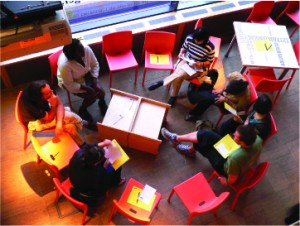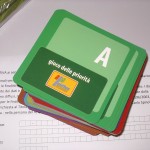 Un gioco aperto a tutti per discutere sulle malattie genetiche e sulla ricerca scientifica
Un gioco aperto a tutti per discutere sulle malattie genetiche e sulla ricerca scientifica
Che cosa sono le malattie genetiche? Qual è il loro impatto sulla vita di chi ne è affetto? E ancora, quanto è difficile studiarle e trovare le risorse per farlo, soprattutto rispetto a patologie molto più diffuse?
A chiunque si sia posto queste domande, ma anche a chi non ci avesse mai pensato e fosse semplicemente incuriosito,  Telethon da appuntamento, a Frascati, il 24 settembre dalle 17 alle 20, al bar “Belvedere” e il 25 settembre dalle 17,00 alle 21,00 lungo la Passeggiata, per l’iniziativa “Dialoghi di scienza”. Con la guida del personale Telethon, il pubblico sarà invitato a informarsi e a discutere su tematiche legate alle malattie genetiche e ai progressi della ricerca scientifica relativamente a queste gravi e rare patologie. Attraverso vere e proprie carte da gioco, i partecipanti potranno rendersi conto di come la ricerca scientifica sulle malattie genetiche presenti difficoltà particolari e avranno, inoltre, la possibilità di esprimere la propria opinione al riguardo.
Telethon da appuntamento, a Frascati, il 24 settembre dalle 17 alle 20, al bar “Belvedere” e il 25 settembre dalle 17,00 alle 21,00 lungo la Passeggiata, per l’iniziativa “Dialoghi di scienza”. Con la guida del personale Telethon, il pubblico sarà invitato a informarsi e a discutere su tematiche legate alle malattie genetiche e ai progressi della ricerca scientifica relativamente a queste gravi e rare patologie. Attraverso vere e proprie carte da gioco, i partecipanti potranno rendersi conto di come la ricerca scientifica sulle malattie genetiche presenti difficoltà particolari e avranno, inoltre, la possibilità di esprimere la propria opinione al riguardo. A game open to everybody to discuss genetic diseases and scientific research
A game open to everybody to discuss genetic diseases and scientific research
What are genetic diseases? Which are their impact on those who are affected? How it’s difficult to find money to study them?
 To anyone who wants an answer to these questions, and to those who had never thought about this, Telethon organizes, in Frascati, on September 24th from 5:00 p.m. to 10:00 p.m. and on September 25th, from 5:00 pm to 9:00 p.m. the event Dialogues about Science.
To anyone who wants an answer to these questions, and to those who had never thought about this, Telethon organizes, in Frascati, on September 24th from 5:00 p.m. to 10:00 p.m. and on September 25th, from 5:00 pm to 9:00 p.m. the event Dialogues about Science.
Conducted by Telethon staff, visitors will be invited to discuss about some open issues related to genetic diseases and to the action of scientific research about these.
Through playing cards, participants will understand the difficult of scientific research about genetic diseases and will have the opportunity to express their point of views.
“Dialoghi di scienza” è quindi essenzialmente un’occasione di confronto su temi scientifici complessi e dibattuti, su cui non necessariamente esistono risposte univoche ma su cui Telethon ritiene importante richiamare l’attenzione. Oltre ad acquisire nuove informazioni i partecipanti saranno aiutati a crearsi un’opinione e ad esprimerla. Allo stesso tempo saranno stimolati a riflettere sulle proprie convinzioni e a rivedere eventuali pregiudizi. Dopo la discussione il pubblico avrà l’occasione di incontrare un ricercatore impegnato nello studio dei meccanismi alla base di una particolare malattia genetica e nella ricerca di una strategia efficace per contrastarla.
L’iniziativa, a partecipazione gratuita, è aperta a un pubblico ampio, dai 14 anni in su: studenti, insegnanti, genitori o semplicemente… curiosi!
In particolare, saranno organizzate due sessioni di gioco, della durata di un’ora e mezza ciascuna. Il numero massimo di partecipanti previsto è di 30 persone. E’ possibile prenotare la partecipazione cliccando qui.
 17-18.30, “Gioco delle priorità”: i partecipanti saranno chiamati a vestire i panni del Ministro della Salute e a stabilire gli interventi a loro giudizio più importanti per affrontare una serie di patologie, alcune rare e poco conosciute, altre a grande diffusione come le malattie cardiovascolari o la malaria. Scopo del gioco è invitare alla riflessione sulle malattie rare e, più in generale, sulle diverse opzioni offerte dalla politica sanitaria e dalla ricerca scientifica, considerato che le risorse sono sempre limitate. Quindi: meglio prevenire o curare? Meglio investire sulla cura sintomatica del paziente nel breve tempo oppure sulla comprensione della malattia, che porterà a cure più efficaci, ma in un futuro non prevedibile?
17-18.30, “Gioco delle priorità”: i partecipanti saranno chiamati a vestire i panni del Ministro della Salute e a stabilire gli interventi a loro giudizio più importanti per affrontare una serie di patologie, alcune rare e poco conosciute, altre a grande diffusione come le malattie cardiovascolari o la malaria. Scopo del gioco è invitare alla riflessione sulle malattie rare e, più in generale, sulle diverse opzioni offerte dalla politica sanitaria e dalla ricerca scientifica, considerato che le risorse sono sempre limitate. Quindi: meglio prevenire o curare? Meglio investire sulla cura sintomatica del paziente nel breve tempo oppure sulla comprensione della malattia, che porterà a cure più efficaci, ma in un futuro non prevedibile?
18.30-20 “Gioco delle opinioni”: in questo gioco si tratteranno temi più delicati, per provare a riflettere insieme su alcune questioni etiche legate alle malattie rare. Scopo del dibattito non è decidere chi ha torto o chi ha ragione. Al contrario si cercherà di far emergere la diversità delle opinioni al riguardo, sottolineando come ogni posizione nasca da pensieri, valori, sensibilità, atteggiamenti culturali che devono essere compresi e accettati, anche se non condivisi.
Dialogues about science is essentially an opportunity to compare complex scientific issues which have not necessarily clear answers but that needs attention.
In addition to acquiring new information, participants will be assisted in forming an opinion, expressing it, and reflecting on their beliefs.
After discussion, participants will also have the opportunity to meet a researcher involved in the study of mechanisms underlying a particular genetic disease and in finding an effective strategy to counter it.
The participation is free and open to a wide audience, aged 14 and over: students, teachers, parents or just curious …!
Two game sessions will be organized, lasting an hour and a half each. The maximum number of participants is 30 people. Reservation is required.
17-18.30 “Game of priority:
 Participants will be asked to assume the role of the minister of Health interventions and to determine, in their opinion, the necessary actions to face a number of diseases, some rare and some other well known as cardiovascular or malaria.
Participants will be asked to assume the role of the minister of Health interventions and to determine, in their opinion, the necessary actions to face a number of diseases, some rare and some other well known as cardiovascular or malaria.
The goal is to reflect on the case of rare diseases and, more generally, on the various options that health policy and scientific research offer to face these diseases, since resources are clearly more limited. The questions are: It is better to prevent or to treat? It is better to invest on the symptomatic treatment of patients in a short time or to understand the disease, which will lead to more effective treatment, but in a foreseeable future?
18.30-20, “Game of opinions”:
In this game you will discuss the most sensitive issues, to try to reflect together on some ethical issues related to rare diseases.
The purpose of the debate is not to decide who is wrong or who’s right on issues on which there may be many personal differences, religious and cultural.
Instead we try to bring out the diversity of views on this matter, stressing that each position arises from thoughts, values, feelings, cultural attitudes that must be understood and accepted, even if not shared.
